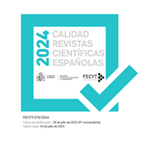Being impolite while pretending to be polite. The rupture of politeness conventions in electoral debates
Resumen
This paper is a part of a larger research that pursues a global understanding of impoliteness in face-to-face electoral debates. That research distinguishes three essential axes, three complementary analytical perspectives: functional strategies of impoliteness, linguistic-discursive mechanisms to implement them and social impacts of impolite acts. In this frame, the present work develops an in-depth analysis of a special category of mechanisms, namely the rupture of politeness conventions, a subgroup within postliteral implicit mechanisms. This subgroup acquires its identity by the fact of carrying out a linguistic action that is conventionally associated with a polite attitude, but doing it in a rhetorically insincere way: the consequence is that apparent politeness becomes impoliteness. Relevant aspects in the characterization of ruptures are isolated and, on this basis, it is developed a detailed analysis of three specific kinds of mechanisms in which ruptures take shape: using ironic statements, developing different forms of overpoliteness and adopting a falsely collaborative attitude toward the interlocutor. The analysis of that group of mechanisms takes into account, simultaneously, the other two axes of the main research, strategies and social impacts.Descargas
Descarga artículo
Licencia
La revista Círculo de Lingüística Aplicada a la Comunicación, para fomentar el intercambio global del conocimiento, facilita el acceso sin restricciones a sus contenidos desde el momento de su publicación en la presente edición electrónica, y por eso es una revista de acceso abierto. Los originales publicados en esta revista son propiedad de la Universidad Complutense de Madrid y es obligatorio citar su procedencia en cualquier reproducción total o parcial. Todos los contenidos se distribuyen bajo una licencia de uso y distribución Creative Commons Reconocimiento 4.0 (CC BY 4.0). Esta circunstancia ha de hacerse constar expresamente de esta forma cuando sea necesario. Puede consultar la versión informativa y el texto legal de la licencia.











